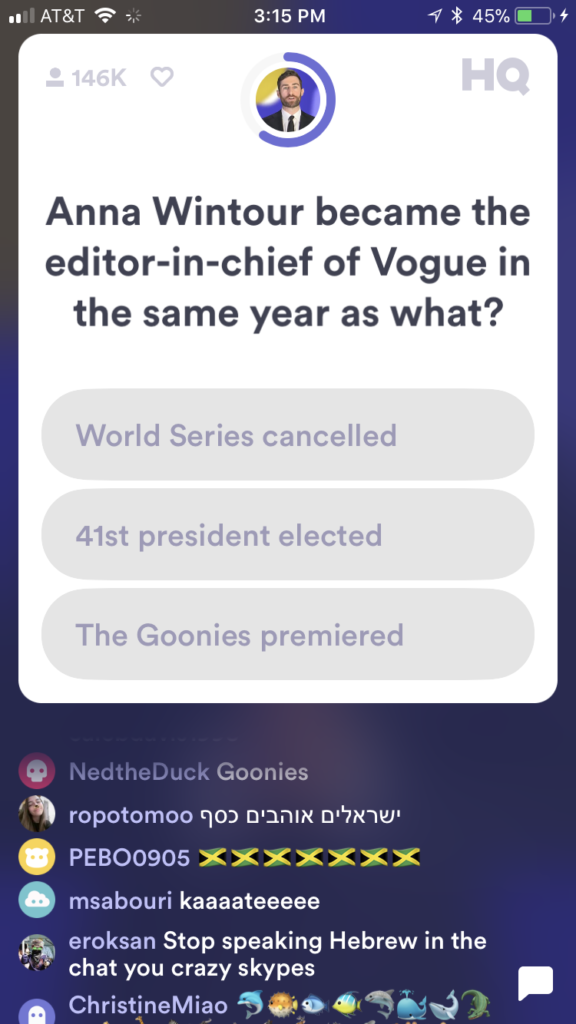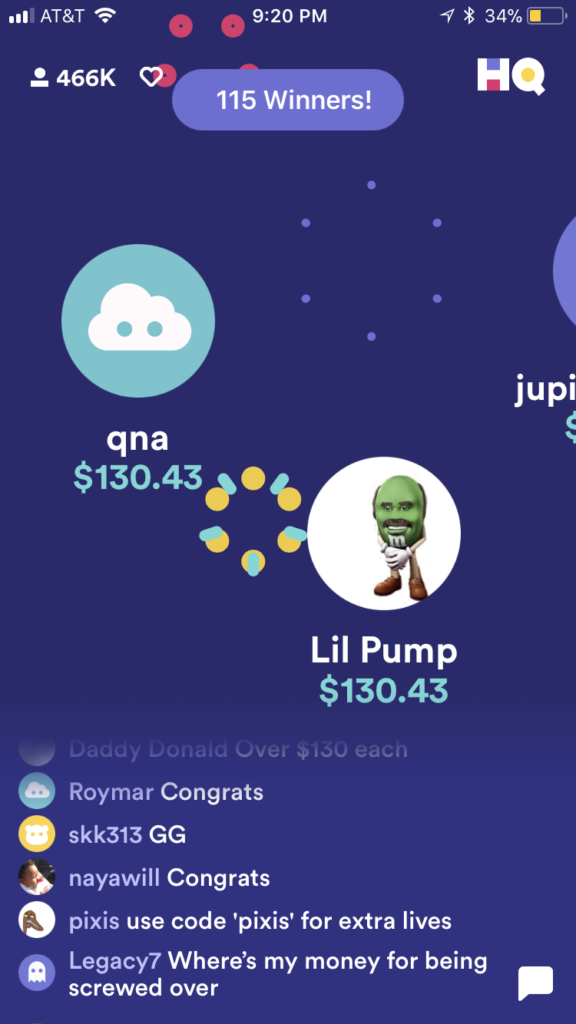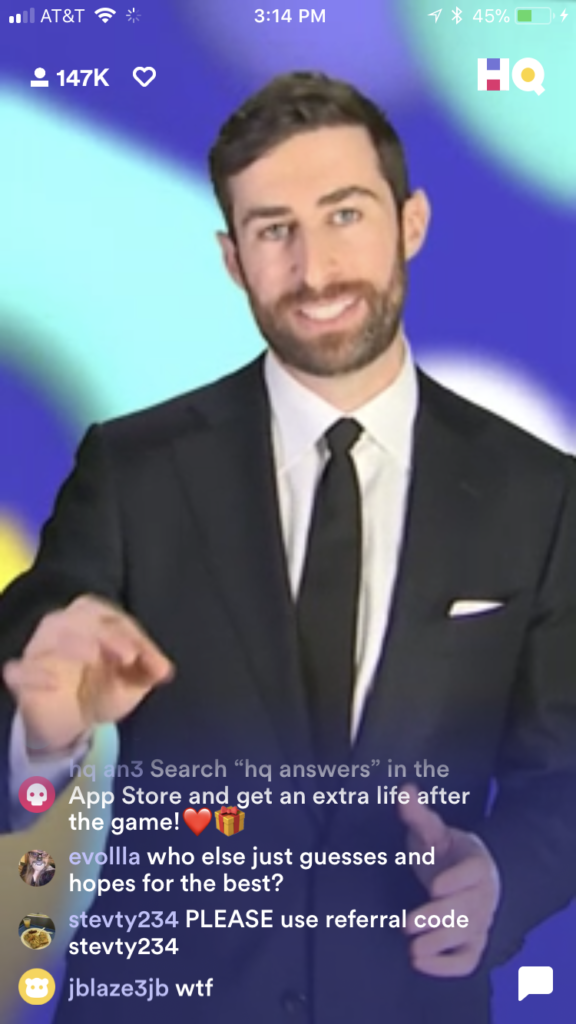 There’s a new mobile game show phenomenon taking place that breaks virtually every rule of the Internet. If you haven’t played HQ Trivia yet, you haven’t participated in a content craze that’s hooking Millennials into a game where the rules are counter-intuitive to this on-demand generation.
There’s a new mobile game show phenomenon taking place that breaks virtually every rule of the Internet. If you haven’t played HQ Trivia yet, you haven’t participated in a content craze that’s hooking Millennials into a game where the rules are counter-intuitive to this on-demand generation.
Hosted by a smartass comic, Scott Rogowsky, HQ Trivia is is live streamed on your smartphone. And unlike every other online game you’ve ever encountered, you can only play this one twice a day – at 3pm and 9pm eastern time. That’s right – an appointment-setting trivia contest where you make sure you have phone in hand, and you’re ready to play.
There’s a cash jackpot up for grabs, 12 trivia questions, with winners who get them all right splitting the cash. Get a question wrong, and you’re watching from the sidelines.
Most of the payoffs are modest, but it’s really not about the money. HQ Trivia is cornering the Internet on a game you can play only at these two times against as many as one million other players.
(Last night, they tweaked the game up against the Grammy Awards – 15 questions for a $15,000 jackpot. The game attracted 1.6 million eager players.)
And it works. Many players stop their at-work activity or their social engagements at the two scheduled times in order to compete.

Conceived by the two guys who created (and cashed out) Vine, Rus Yusupov and Colin Kroll, HQ Trivia is modeled after classic game shows like “Jeopardy.” But because it live streams on your smartphone, and you’re playing against the world (or at least those who opened the app at the two designated times), there’s a rush about HQ Trivia.
And yes, it’s like so many radio contests we’ve all designed in the past, reminding us how the contest fundamentals we all learned still work – flawlessly. And HQ Trivia also reinforces those same contest values in ways that serve as a refresher to every programmer who has ever wrestled with a caller 9 contest.
One of the first things that occurred to me is that there are no ads or sponsors – yet. It’s not difficult to conjure up basic strategies where this game could easily monetize itself. But for now at least, Yusupov and Kroll seem content to build a solid base of users who are in the HQ Trivia habit.
Here are a dozen ways HQ Trivia mirrors radio contests – or improves upon the “old rules” – all of which will cause you to think about your own contest models and beliefs:
1. It’s not random, it’s skill
Unlike a “text to win” or caller 9 contest, there’s skill involved in playing HQ Trivia. And like the best games, it gets more challenging the deeper you get in. If you remember the first time you watched “Who Wants To Be A Millionaire” on prime time television, HQ Trivia feels something like that, ramping up the difficulty as more players are eliminated.
2. It’s not about the money
In fact, a check of the leaderboard show a few people have netted just over $2,000. Most others have earned in the neighborhood of just $60-$70 bucks. The average radio station gives away more cash in six months than HQ Trivia. You don’t play to get rich – you play to compete.
3. It’s fun
Unlike so many radio contests that are simply games of chance or even throwaways, HQ Trivia is fun to play. You’re encouraged to be a part of a group with other people in the room hanging over your shoulder. At work, it’s better than a coffee break. And at night, it’s a nice escape from cable news or Netflix.
4. It’s the ultimate collective contest
That’s because you’re playing against people all over the U.S. – and the world. But unlike radio’s group contests, designed to save money with no real benefit to the listener, HQ Trivia takes its global reach and makes it interesting. Scrolling chat reminds you that you’re not alone.
5. There’s a payoff
You’ve no doubt seen research about radio contests suggesting many people don’t feel they’re legit and that people really win. With HQ Trivia, the winners are announced and displayed after each game, and the “leaderboard” is available on your app. Rogowsky reminds you of the survivor count after each question, so you know how many you’re up against.
6. It’s live
There’s a certain buzz to this game because like radio, it’s real-time. This isn’t like a casual round of “Angry Birds” or “Words With Friends” that you can pick up and put down whenever you like or even play distractedly. You feel the palpable pressure of the clock in much the same way you do during a live, well-executed radio contest benchmark.
7. It’s clear and concise
There are some sub-rules (especially involving “extra lives” that can get you further in a game), and I’d expect more of these as the creators hone HQ Trivia down. But it’s dead simple to learn and play this game – or explain it to others. Too many radio contests break this rule, and come with too many hoops.
8. It sets appointments
The folks at Nielsen are nodding. At its heart, HQ Trivia is brilliant occasion-setting. It’s a reminder of the wisdom of selecting times that people can easily remember. And there are just two times during weekdays, and only 9pm on weekends. These limited play times makes them seem more special.
9. It’s basic trivia
HQ Trivia is not brain surgery. From “Trivial Pursuit” to “Who Wants To Be A Millionaire?” to all those trivia nights in bars and pubs around the globe, this stuff never goes out of style – and it’s habit-forming. Most people love a good challenge, and we all feel we know a little something about lots of trivial stuff. Of course, that’s what HQ Trivia brilliantly taps into.
10. It’s a community
The best radio stations make you feel like you’re part of a tribe that shares your taste. HQ Trivia features that same dynamic, aided by the chat, but also the reality that you feel like there are a lot of folks doing what you’re doing. We’ve all been part of contests that have gone viral in a market. HQ Trivia is like that.
11. It lasts about 15 minutes (yup, a quarter-hour)
Whether by chance or design (probably the latter), a game of HQ Trivia lasts about 15 minutes end to end. That seems like the perfect length. 
12. It features the element of personality
And like any successful show, Rogowsky likely earns both “1s” and “5s” in HQ Trivia’s research. You love his quips and puns – or he annoys you. But in either case, he’s an integral part of the package. “Quiz Daddy” Rogowsky is a reminder that every great contest and game gets even better when there’s an entertainer involved. So many radio contests have become mechanical affairs where a DJ sleepwalks through the game. Rogowsky is engaged and additive to HQ Trivia.
13. It appeals to Millennials
Yes, this one’s a bonus – and a big one. For a generation where media and entertainment is always on-demand, the belief young people won’t drop what they’re doing to play a contest is debunked by the success of HQ Trivia. And it’s generating campus buzz as evidenced by this story in UConn’s student newspaper – “How HQ Trivia is taking over the globe one question at a time.” If it’s interesting, fun, and compelling, a contest will cut through – whether you’re living in a college dorm or in a golf course community.
What can radio learn from this phenomenon than can be applied to contesting activity and architecture?
And how does HQ Trivia make you rethink some of the basics of contesting – as well as reinforcing your beliefs in why they work in the first place?
Finally, how does this phenomenon cause you to look at your station’s mobile app, and think about a game/contesting element could make it so much more essential to your audience (and people who don’t listen to your station)?
These are tactical and strategic questions where the right answers can help build and enhance a station and/or a personality brand.
And they’re certainly not trivial.
Thanks, Steve Goldstein!
- What To Do If Your Radio Station Goes Through A Midlife Crisis - April 25, 2025
- A 2020 Lesson?It Could All Be Gone In A Flash - April 24, 2025
- How AI Can Give Radio Personalities More…PERSONALITY - April 23, 2025




Leave a Reply